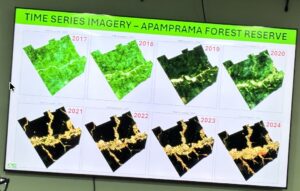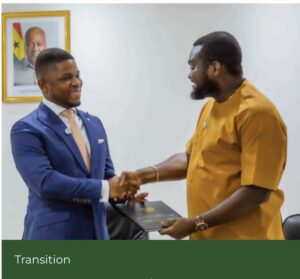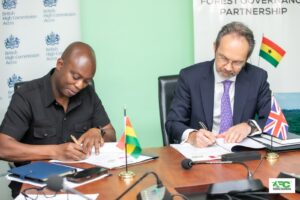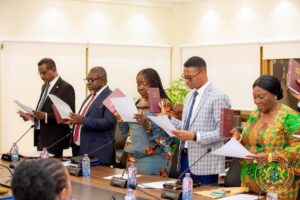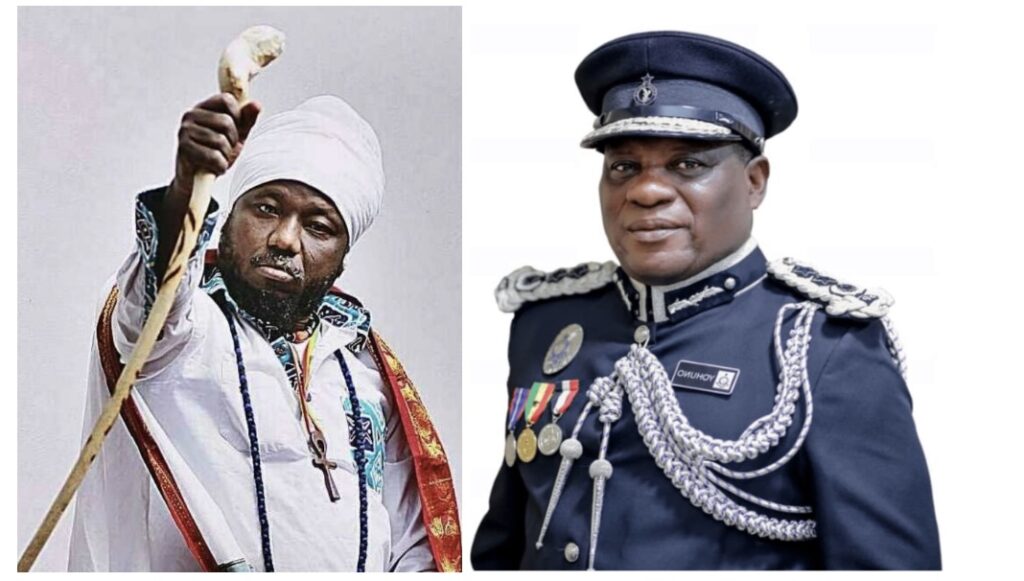
PHOTO: IGP Yohuno and Blakk Rasta
In a rare but refreshing twist from the usual high-handed security approach, newly-appointed Inspector-General of Police, Christian Tetteh Yohuno, has won unexpected praise after dropping his guard and openly apologising to the people of Bawku.
During a crucial visit to the troubled region, the IGP ditched the usual tough-guy script and instead bowed to the Bawkunaba, asking for forgiveness over the conduct of police in the area. The dramatic gesture, seen as a sharp turn from the usual policing playbook, has struck a chord with many, including outspoken broadcaster and activist Blakk Rasta, who hailed it as a “bold and beautiful” moment of healing.
Speaking on his programme, Blakk Rasta commended the IGP’s recent visit to Bawku, calling it “a powerful move of reconciliation” in a region scarred by long-standing tension and mistrust. The IGP’s trip, which included a symbolic plea for forgiveness from the Bawkunaba, the traditional overlord of Bawku, was seen by many as a fresh departure from the often combative posture of state authorities in the area.
“This is a man who just came into office, and though it’s early days yet, Yohuno has shown leadership — not by flexing power, but by acknowledging past wrongs,” Blakk Rasta remarked. “He understands that you don’t bulldoze your way into peace. You walk into it humbly — and that’s exactly what he did.”
During the April 11 visit, IGP Yohuno addressed community leaders, youth, and security personnel, admitting that in the course of policing, mistakes had been made. “We are the people to work with you,” the IGP said.
“And as a result of doing this work, one or two people will commit some mistakes… Let us make sure we correct those mistakes so we can continue to work together.”
For Blakk Rasta, this was not just words but “a deliberate posture of empathy” in a town where police presence has often been perceived as oppressive. “The IGP didn’t go there to issue threats. He didn’t go there to flex muscles. He went there to listen, to apologise, and to invite peace. That, my brother, my sister, is leadership,” he added.
The IGP’s meeting with the Bawkunaba was particularly significant. Blakk Rasta emphasised that in Bawku, political overtures often fall on deaf ears — but traditional authority remains a powerful force for unity. “No politician can move the youth now,” he said. “But the Bawkunaba? He commands respect. This is why Yohuno’s choice to go to the palace first was not just smart — it was deeply respectful.”
Amid his appeals for calm, the IGP also addressed the fears of security officers stationed in the conflict-prone area, reassuring both residents and personnel that the police were committed to restoring peace, not escalating tensions. He further offered an olive branch to the youth — a promise of special recruitment opportunities into the Ghana Police Service, conditional on the cessation of hostilities.
“This is not just a peace offering — it’s an invitation to ownership, to transformation, to give these youth a stake in the security of their own community,” Blakk Rasta enthused. “If the youth embrace this, it will not just bring jobs — it will bring dignity.”
The broadcaster was also quick to contrast the IGP’s efforts with the perceived inaction of the political class. “The politicians have failed in Bawku,” he said bluntly. “It’s not about land anymore. It’s about people recognising each other as brothers. That is what will bring peace.”
He noted that President Mahama had visited the region in the past, engaging with the ancient traditional rulers of Mamprugu and Bawku, and though the results remain limited, the symbolism matters. “The president has shown concern, yes. But it’s now up to the likes of Yohuno to carry the flame of that concern into real change on the ground.”
Blakk Rasta closed his remarks with a hopeful charge to all parties: “This is the time to bury the hatchet. To the Bawkunaba, thank you. To the youth of Bawku, this is your chance. And to IGP Yohuno, walk this path with humility and truth. Ghana is watching — and history is listening.”

